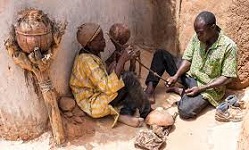As Africa marks today the African Traditional Medicine Day, World Health Organization (WHO) Regional Director for Africa, Dr Matshidiso Moeti, issued the following message.
In her statement, Dr Matshidiso Moeti highlighted the contributions of traditional medicine in Africa for the universal health coverage in Africa, and how WHO has been supporting African countries develop code of ethics, among others. “On 31 August every year for the past two decades, we have marked African Traditional Medicine Day, to honour the integral role of traditional medicine in the health and welfare of generations of people on the continent.
This year’s theme, “Two Decades of African Traditional Medicine Day: Progress Towards Achieving Universal Health Coverage in Africa”, gives us the opportunity to reflect on the progress towards African traditional medicine being afforded the prominence it deserves in national health systems.
Traditional medicine has been the trusted, acceptable, affordable and accessible source of health care for African populations for centuries. Still today, 80% of the continent’s population relies on traditional medicine for their basic health needs.
Since African Traditional Medicine Day was initiated in 2003, the continent has seen the implementation of WHO Regional Strategies on Promoting and Enhancing the Role of Traditional Medicine in Health Systems, 2001-2010 and 2013–2023, as well as plans of action for the First (2001-2010) and Second Decades of African Traditional Medicine (2011-2020).
Member States have used the day to catalyze discussion forums around national policies on traditional medicine, cultivation of medicinal plants, including training of traditional health practitioners, and their collaboration with their conventional counterparts.
These activities prompted more than 40 African Region countries to develop national traditional medicine policies by 2022, up from only eight in 2000. Thirty countries have also integrated traditional medicine into their national policies, a 100% improvement on the situation in 2000. Additionally, 39 countries have established regulatory frameworks for traditional medicine practitioners, compared to only one in 2000, demonstrating good governance and leadership.
Today, with 34 research institutes in 26 countries dedicated to traditional medicine research and development, it remains a promising industry, with great commercial potential if marketed appropriately internationally. Twelve of these countries reported making public fund allocations to this research and development across the past 10 years.
These institutes have employed WHO guidelines and protocols to assess the quality, safety and efficacy of traditional medicine-based therapeutics for priority diseases, such as HIV/AIDS, malaria, diabetes, hypertension, Sickle-Cell Disease and, recently, COVID-19. Currently 17 countries, as opposed to zero in 2000, have frameworks for the protection of intellectual property rights and traditional medical knowledge.
To advance continental efforts towards equitable access to medical products and technologies, all but eight African Member States are now engaged in large-scale cultivation of medicinal and aromatic plants. Nineteen countries have also established facilities for the local manufacture of herbal medicines, with the number of herbal medicines registered by national regulatory authorities in 14 countries increasing from just 20 in 2000, to more than 100 this year. More than 45 herbal medicines now feature on national essential medicines lists.
In another important advance, 25 countries have now integrated traditional medicine into their health sciences curricula, while 20 have established training programs for traditional health practitioners and health sciences students, to strengthen human resources in both traditional medicine and primary health care.
Thirty-nine countries have also developed legal frameworks for traditional health practitioners. Positive signs of traditional and conventional health systems working in parallel for the good of their patients is that referrals of patients between the two sectors are now taking place routinely in 17 countries.
A total of 24 countries have also developed Codes of Ethics and Practice for traditional health practitioners, to ensure safety and standards of service delivery. Ghana is setting the example for the continent, with the establishment of traditional medicine clinics in 55 regional hospital settings to date.
WHO in the African Region has supported joint missions with partners to the Democratic Republic of Congo, Ghana, Madagascar, Nigeria, South Africa and Uganda, to monitor clinical trials of traditional medicine-based therapeutics proposed for COVID-19, eight of which are ongoing. The political will displayed by countries to support these innovations has been inspiring, as has the level of available infrastructure and skills.
On African Traditional Medicine Day today, I call on governments to strengthen collaboration between science, technology and innovation institutions; traditional health practitioners and the private sector, to fast-track research and development, and local manufacturing of traditional medicine-based therapeutics for the health and well-being of Africa’s people.”

